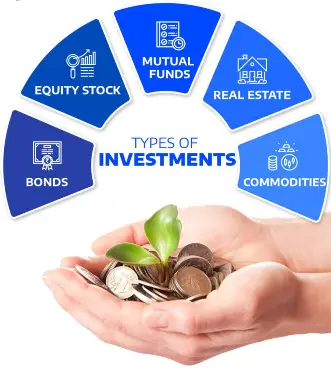Types of Investments
The New Zealand investment market is expanding worldwide, which has led to more and more people becoming involved in the money-making industry. There are many different types of investments available to choose from. As such, it's become more important for investors to educate themselves about the options. This article will explore some popular investment opportunities for New Zealand, including term deposits, index funds, shares, property, and more.

Main Types Of Investments
Check out the basics of property investment in New Zealand. Property Investment Basics
Information on the basics of investing in Kiwisaver In New Zealand. Kiwisaver Basics
Check out out how term investment works and what are the risk and rewards of term deposit. Basics of Term Deposit
Information on what are index funds and how to get started with investing in index funds in New Zealand : Index Fund Investing
Basics of how to invest in bonds in New Zealand. The risk and rewards of it. Bond Investment
Information on what share investment is all about and how you can start investing in shares in New Zealand. Invest in Shares
Check what crowdfunding investment is all about in New Zealand. Types of it and the risk and rewards of it. Crowdfunding Investment
Beginners Guide to Type of investments
There are many different types of investments you can choose from when looking to invest in New Zealand. We’ve covered a few of them here, but if you want to learn more or start investing, it’s best to do some research or talk to an investment advisor first. Hopefully, this will help you get started on your investment journey for New Zealand.
NZ is one of the most exciting places in the world to invest today. Discover the main types of investment available in New Zealand.
Property investment In New Zealand For Beginners
If you’re looking for a solid long-term investment in New Zealand, property is hard to beat. The property market is one of the most popular investment opportunities in New Zealanders.
How to Invest :
Many different property investment strategies are available, including buy-to-let, holiday lets, serviced accommodation, and HMOs (Houses in Multiple Occupancy).
You can invest as a traditional landlord, with a mortgage on investment property, or through property funds and REITs (Real Estate Investment Trusts) – which allow investors to gain exposure to commercial properties without borrowing money.
Risk:
When you buy a property, you will have to borrow money from a bank for most of its cost. This means that if housing prices go down, the property might be worth less than what you paid for it. To reduce your risk, you should only borrow what you can comfortably afford to repay over the life of the loan. If something happens and your income is reduced, you won’t get behind on your repayments and damage your credit history.
Return on Investment:
The return on a property investment depends on how much your property increases in value and how much rent you charge.
You should also take account of any costs associated with holding the investment, such as real estate agent fees, rates, and maintenance costs.
KiwiSaver Investment In New Zealand for Beginners
KiwiSaver is a savings scheme that helps you save for your retirement. The New Zealand government set it up to help Kiwis reach a better standard of living when they retire.
How Does KiwiSaver Work :
A percentage of what you earn goes into a KiwiSaver scheme, along with money from the government. You choose how much goes in and what scheme you want to invest. This will determine how much risk you want to take vs. how much you want to earn.
This enrolment can be stopped at any time, but you will miss out on all the great benefits that come with being a member.
These benefits include:
- A $1,000 kick-start from the government when you first join (after three months)
- An employer contribution of 3% of your salary, paid out to your KiwiSaver account each pay
- A further tax credit of $521 per year for each member over 18 who contributes at least $1,042 per year (after fees and tax)
- Saving for your retirement through compulsory contributions from your pay and voluntary top-ups
You can join KiwiSaver if you are:
A New Zealand citizen or entitled to live in New Zealand indefinitely; and living or normally living in New Zealand.
Term Deposits Investment for beginners
A term deposit is a type of investment with a fixed interest rate for a specified length of time (the ‘term’). This interest rate is generally higher than it would be if you left the money in your savings account. The longer the term of your investment, the higher the interest rate you will receive.
How Does term Deposit Work :
When you make a term deposit, you’re lending money to a bank. The bank then uses this money to provide loans to businesses and home buyers. In exchange for using your money, the bank provides you with interest on the term deposit.
The interest rate is fixed for the life of the term deposit, so if you don’t want any risk, there’s no need to worry about whether the interest rate is going up or down
What are the risks with term deposit :
Term deposits are generally considered low-risk products because they are bank-backed and covered by the Government Deposit Guarantee Scheme. However, there’s always some risk involved.
The most important thing to know about term deposits is that if you cash them in before their maturity date, it may decrease your return on investment (ROI). If you think you may need access to your money before the maturity date, look into other products that might better suit your needs.
Investment In Index Funds For Beginners
If you’re considering investing in an index fund in New Zealand, be sure you understand how this type of investment works and what it can do for your portfolio.
What are Index Funds :
An index fund is a type of mutual fund that tracks a particular stock market index. Index funds in New Zealand are designed to mirror the performance of an equity market index.
Index funds are typically passively managed, meaning there is little trading involved. Therefore, it has lower costs than actively managed funds, which can involve more trading and higher fees for investors.
The most common indexes in New Zealand are the NZX 50 and S&P/NZX 10.
Risk v Return on Investment :
Index funds typically have lower investment returns than other investments because the fees are much lower. However, they also carry less risk because they do not involve as much trading as other funds, which can be riskier depending on the market climate at the time.
How to Invest in Index Funds :
There are two main ways to invest: through an investment platform or a broker directly via the stock exchange.
An investment platform offers you access to several index funds through one account, but you will usually be charged a fee for this service.
Investment In Bonds For Beginners
Bonds are debt securities that companies or governments issue to raise capital. They loan their debt securities out to investors, who purchase the bonds to earn an interest rate over time.
Risk vs. Return:
Bonds have different risks and returns depending on the type of bond you buy: corporate or government. The difference is that while companies issue corporate bonds, government bonds are issued by governments.
Generally speaking, corporate bonds are riskier than government bonds but offer higher returns. But investing in more established companies with strong credit ratings will give you similar security and lower risk than investing in government bonds.
How Much can I get back :
Bonds have different risks and returns depending on the type of bond you buy: corporate or government. The difference is that while companies issue corporate bonds, government bonds are issued by governments.
Generally speaking, corporate bonds are riskier than government bonds but offer higher returns. But investing in more established companies with strong credit ratings will give you similar security and lower risk than investing in government bonds.
Investment In Shares For Beginners
Shares, also known as equities or stocks, are the most common way of owning a piece of a company. You buy shares in a company and become a shareholder.
As a shareholder, you own part of the company, giving you the right to vote at shareholder meetings and receive dividends. The number of shares you own will depend on how much you invested in the company.
Shares in public companies can be traded on stock exchanges like the NZX in New Zealand.
What are the Risks :
Shares can be risky because their share price can drop suddenly and without warning, even when a company is doing well. This is because share prices reflect the financial strength of an individual company and market sentiment – how investors feel about investing in general at any point in time.
During times of economic uncertainty, such as recessions and depressions, share prices often fall sharply as investors try to sell their shares quickly to avoid further losses. That’s why investing in shares should be seen as a long-term investment strategy rather than something that you can make money from very quickly or easily.
Return on Investment :
The return on your investment depends on the type of shares you buy and how long you hold them.
Investment In Crowdfunding For Beginners
Crowdfunding is a new way of funding businesses and projects. Investors can become part owners in these businesses by buying shares or units, usually through an online platform or website.
In New Zealand, there are two types of crowdfunding:
Donation-based crowdfunding – this involves people donating money to a project or cause. The backers usually receive no financial reward for their contribution but may receive a free sample or product that has been based on the idea they have contributed to.
Equity-based crowdfunding involves people buying shares in a company that needs capital. In exchange for their investment, backers will receive equity (shares) in the business and any returns on those shares when the company is sold or goes public.
Risk v Return on Investment :
The higher the risk, the higher the potential return on investment. You should invest only what you can afford to lose and research on companies before making any investment decisions. This means reading all the information available on the company and seeking independent advice from an expert if you need to.



